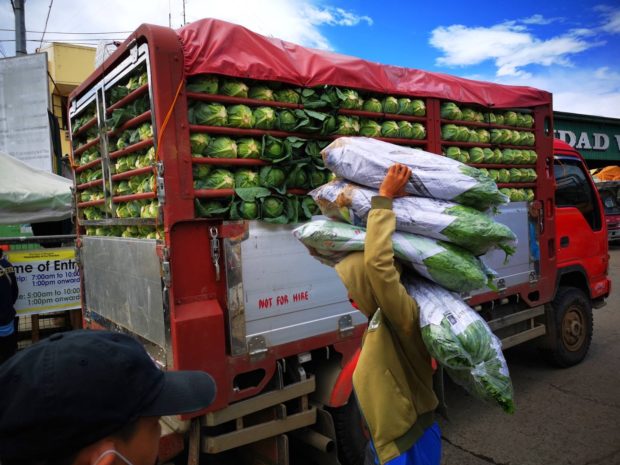
TRADING DAY Salad vegetables sold in Metro Manila are grown in Benguet and shipped to trading posts in the capital town of La Trini- dad. —EV ESPIRITU
BAGUIO CITY—The demand for vegetables grown in Cordillera farms has gone down, causing huge income losses, at times bankruptcy, among farmers and traders in Benguet province.
Fortunato Bunaldi, a vegetable trader in Benguet’s capital town of La Trinidad, said many of their bulk buyers outside the province had stopped placing their orders.
“Even if farmers produce vegetables but their customers have no work or are out of business, how can they buy from us?” Bunaldi told the Inquirer on Tuesday.
Bunaldi said their deliveries had dropped by 50 percent when the government enforced lockdowns to address the spread of COVID-19.
“The daily vegetable orders we get from our buyers could no longer fill our trucks,” he said.
The community quarantine has been disrupting the vegetable supply since businesses that rely heavily on fresh produce have been forced to stop operations, Bunaldi said.“We have incurred huge losses and if the restrictions continue, we have no choice but to stop our business as well,” he said.
Bunaldi added: “For us, traders, we can calibrate our losses because we can adjust depending on the orders we get. But still we also have fixed expenses that we need to cover.”The case is different for farmers who have no way to recover their losses once their harvests rot in the fields, he noted.
Most highland vegetables sold in Metro Manila markets, such as carrots, Baguio beans, cabbage, lettuce and cauliflower, are grown in farms in Benguet and Mountain Province.Records from the Department of Agriculture showed that these provinces and the rest of the Cordillera produce 13,500 metric tons weekly. The demand in Metro Manila alone used to be 5,000 MT a week.Border control
Agot Balanoy, manager of the Benguet Farmers Multipurpose Cooperative, said inconsistent border control policies of local government units (LGUs) and the lack of consultation with farmers were among the problems that they had to deal with amid the pandemic.“Some local governments do not honor the guidelines of the national task force on food and essentials,” she said, noting that these were causing delivery delays.“In many instances, we must assert [the guidelines] and negotiate with the LGUs and government agencies so farmers and traders would be allowed to continue delivering their products,” Balanoy said.
She cited their experience at a checkpoint in Pugo town in La Union on April 13 when border guards prevented vegetable traders from passing through the province.
Balanoy said the truck driver was required to produce a negative real-time reverse transcription-polymerase chain reaction (RT-PCR) test result. The guidelines of the national Inter-Agency Task Force for the Management of Emerging Infectious Diseases (IATF) only require an antigen test.She said the delay caused by the incident destroyed at least 3 tons of assorted vegetables and 90 kilos of strawberries.
“So, who’s going to shoulder those losses? It is either the farmer or consumer or both,” Balanoy said.
La Union order
On April 10, La Union Gov. Francisco Emmanuel Ortega III issued an executive order requiring a negative RT-PCR test result “regardless of the origin and duration of stay outside the province.”
Each RT-PCR test costs between P4,000 and P5,000 in private testing centers while government facilities may charge up to P3,800.
Ortega’s order, which also covers travelers passing through the province, came out after the City of San Fernando and the towns of Agoo, Aringay, Naguilian, Luna and Tubao were placed on a modified enhanced community quarantine, the second most stringent quarantine classification.But the national IATF had repeatedly reminded local governments to ensure “the unimpeded movement of all types of cargo (food and nonfood).”After getting complaints, Ortega issued another executive order on April 14 amending the border control to allow deliveries and cargoes to pass through the province without any test for drivers.
Truck drivers are now required to present only a delivery manifest and stay in provincial boundaries for only three hours. INQ